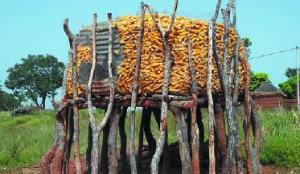
• Lack of both knowledge on post-harvest handling and appropriate household storage facilities are among the major reasons farmers end up selling all their produce.
By NICHOLAS MWALE –
MANY small-scale farmers in Zambia today are faced with serious storage facilities for their produce.
It is common among small-scale farmers in rural Zambia to complain of hunger and cry for relief food soon after the harvesting period.
This is not only because they do not produce enough, but partly because they sell all their produce without considering their household food security, while others use the money from the sale of their crops to buy food.
Lack of knowledge on post-harvest handling and lack of appropriate household storage facilities are among the major reasons farmers end up selling all their produce.
It is for this reason that the World Food Programme (WFP), through its Purchase for Progress (P4P) project has taken a deliberate move to train some farmers and officers in post-harvest handling.
WFP targets sectors, it is working with in implementing its Home Grown School Feeding programme such as farmers, researchers, agricultural and education officers.
A number of trainings have so far been conducted with the recent training of trainers conducted in partnership with Purdue University of the United States of America at Cross Roads Lodge in Lusaka.
The training attracted 30 participants that included researchers, agricultural and education officers drawn from Chadiza, Chipata, Katete and Mazabuka districts.
The training of trainers saw the introduction of an improved storage bag with 100 kilogramme capacity developed by Purdue University.
Purdue University lecturer Dieudonne Baributsa introduced the 100 Kilogramme special bag called ‘PICS,’ (Purdue Improved Crop Storage), which has two plastics inside.
“It is special in the sense that unlike other bags, this one can store grain for one year without being attacked by insects, the plastics inside the bags cannot make the grain go bad for as long as it is stored when is completely dry,” Dr. Baributsa explained.
Interestingly, Dr Baributsa revealed that once the grain is stored in PICS bags, there is no use of pesticides or any chemicals.
Dr Baributsa, who is also Research Assistant Professor in the Department of Entemology at Purdue University, said the institution is creating demand for the improved storage bags by providing training.
According to Dr. Baributsa, Purdue University developed the technology in the 1980s and has been highly promoted in the West and Central Africa were about two million farmers were now using the bags.
“The bags are working effectively and I can assure you that it has really helped to reduce post-harvest losses, the distribution has reached about two million farmers now,” he said.
Dr Baributsa said two ways of food storage for food security, namely, warehouse and household, and that the bags are best suited for household food security.
He said different types of grain can be stored in the bags although West and Central African farmers are mainly using them to store cowpeas whose losses are usually very high and could even reach 90 percent.
The bags whose price ranges from US$2 dollars to US$4 dollars will soon be available on the Zambian market.
“We wanted to first find a manufacturer whom we have already identified,” Dr Baributsa said. “Polythene Products Manufacturing Company did the tests and has already produced 5,000 bags.”
According to Dr Baributsa, manufacturers will create retail outlets and will be given a license to produce and sell the bags while Purdue University will provide technical capacity.
“We want to create a sustainable system that will be there beyond the project life time.” he explained.
WFP’s Purchase for Progress (P4P) Country Coordinator Aurore Rusiga explained that the organisation is pioneering the post-harvest training because it is promoting the production of cowpeas and other nutritious legumes for the Home Grown School Feeding Programme that is currently being implemented in various provinces.
Ms Rusiga said post-harvest handling trainings and introduction of the Improved Crop Storage will provide an opportunity for farmers to produce more as they will be able to avoid losses.
She said the P4P project has never obtained enough cowpeas as per demand partly due to post-harvest losses.
“We realised that we cannot only promote production without looking at storage which is also cardinal to food security and that is the reason we partnered with Purdue University because their storage bags are good initiative and we want to try them on the Zambian environment,” Ms Rusiga said.
It is envisaged that the training will enable participants to promote the storage technology and give feedback on the adoption levels.
She said participants will follow four steps in promoting the technology namely: awareness, demonstration, follow-up and open the bags ceremony.
“They first have to create awareness among the farmers and then carry out demonstration through which farmers will be given the bags to store the grain for a stipulated period,” she explained.
“After that, they will make a follow-up to see how farmers are keeping the bags before the last step of opening the bags to see if all farmers kept the grain intact.”
It is obvious that the PICS bags can also help farmers sell their produce profitably as they can safely keep the grain until the prices are favourable.
Undoubtedly, the technology also provides a good initiative of ensuring food security at both household and national level.-NAIS






